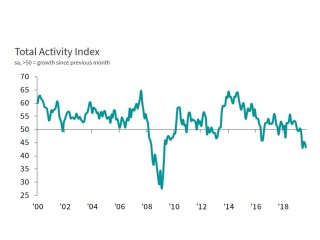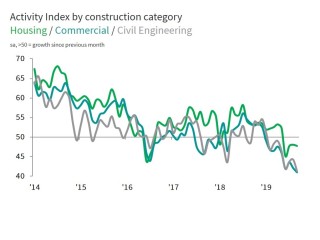The survey shows that building activity in September 2019 fell at the second-fastest rate since April 2009, only narrowly outpaced by the fall seen in June this year. A historically steep drop in new orders was also registered, while recruitment activity fell at the fastest rate since the end of 2010.
Although there was a marginal upturn in optimism, the level signalled by survey data was still much weaker than usual in these surveys.
The headline seasonally adjusted IHS Markit/CIPS UK Construction Total Activity Index posted 43.3 in September, down from 45.0 recorded in August. Anything below 50 indicates the industry is in decline and the lower the score the faster it is declining. September’s score was only marginally better that the 43.1 posted in June, which itself marked a 10-year low-point for the industry, since the global financial crisis of 2008/09.
Commercial activity remained the worst-performing segment – as it has been since March. Civil engineering activity dropped at a similarly sharp rate. Residential construction showed its fourth successive monthly decrease.
The strong dip in sales coincided with a further tapering of purchasing activity by UK construction companies in September. Buying levels declined at the joint-fastest rate since January 2010 due to lower operational requirements and increased efforts to contain costs. Despite this, input prices continued to rise at a strong rate during September although the rate of inflation eased to a three-and-a-half-year low in line with deteriorated input demand.
Survey respondents attributed the slowdown to Brexit uncertainty and the resulting hesitancy caused among clients, as well as a general underlying weakness in demand.
The gloom of the purchasing managers' survey is in stark contrast to data gathered by the Builders' Conference, which shows £6.5bn worth of new orders signed in September, making it a well-above-average month. [See our report here.]
Looking ahead, UK construction firms in the IHS Markit suurvey were only mildly optimistic that output volumes would pick up over the coming 12 months, once Brexit is resolved.

Joe Hayes, an economist at IHS Markit, which compiles the survey, said: “The UK construction sector remained mired in a downturn at the end of the third quarter, according to the latest PMI data. Activity is being pulled down at its second-fastest clip for over a decade as firms are buffeted by client hesitancy, heightened Brexit uncertainty and a weak outlook for the UK economy. The commercial sector was a notable casualty in September, with building activity here falling at the fastest rate since April 2009, highlighting the damaging effects of project delays and belt-tightening.
"Low confidence has subsequently caused construction order books to fall substantially. Panellists reported another sharp drop in demand in September that was one of the strongest in the post-crisis era. Forward-looking indicators suggest that businesses are bracing themselves for a protracted construction slump, with input purchasing and employment both falling at rates unsurpassed since 2010.
"Overall, the performance of the UK economy once again hinges on the service sector showing a marked degree of resilience to offset the weakness seen in construction and manufacturing."
Duncan Brock, group director at the Chartered Institute of Procurement & Supply, which sponsors the survey, added: "The construction sector suffered another devastating result in September with the second fastest fall in new orders since March 2009 and the financial crisis. After a relentless six-month decline in order books driven by Brexit uncertainty and political indecision, this is hardly surprising.
"Residential building continued to be hit hard with a fourth successive month of deterioration but the commercial sector took the biggest brunt of this downturn spiral as clients turned their back on spending and committing to larger projects. This in turn had significant knock-on effects on construction employment with the biggest fall in staffing levels since December 2010. Such disappointing news as the sector is still recovering from a lack of skills and capacity created by the last recession.
"Looking ahead the signs do not look positive. Even a moderation in input prices since March 2019 and some moderate improvement in supply chain pressures will not be enough to keep the wolf from the door as no-deal looms and businesses remain Brexit unsteady."
Got a story? Email news@theconstructionindex.co.uk




